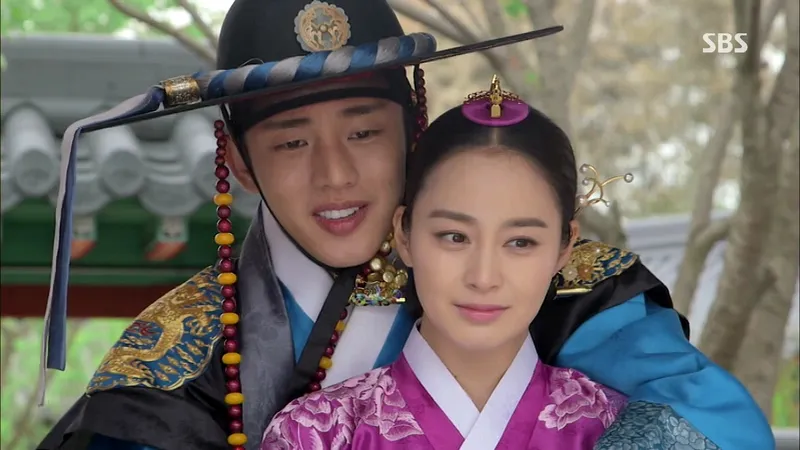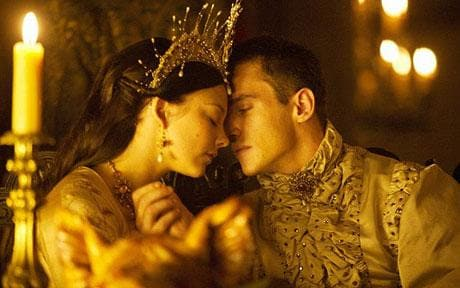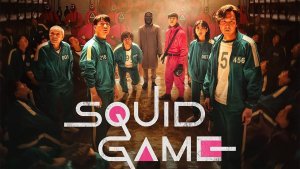Disclaimer: This article is subjective based on my own perspective. Spoiler Warning: This article contains spoilers. [Lightmode/Darkmode]
|
Over the years, I have always thought about the similarities between Jang Hee Bin/Jang Ok Jung, who was the third Queen consort of King SukJong of Joseon, and Queen Anne Boleyn of England, the second wife of King Henry VIII. Not only was their rise to power similar, but so were their husbands and the level of enchantment they held on them. While holding on to this thought, the ladies’ predecessors could be seen from very similar lenses, for they had to be cast out for the femme fatale to take over the roles as mother of the nations. I have written this article focusing on the history and on the depictions of these historical figures in the media. It's interesting to see that the personalities of some of the historical figures I will be discussing here differ in the media as they are told in different tones and filters. This first part of this series focuses on King SukJong and Henry VIII who changed the shape of their nation's politics due to their need for a male heir. |
 |
King SukJong is reputed as a master political strategist in history who maintained his stronghold in power by leveraging it between two political factions: the Sorons and the Norons. Depending on the drama, he is usually depicted as being ruthless. For when he took away power from one faction, they were driven out of politics, a lot of them were annihilated. (And this was also how he was documented in history) In defense of Sukjong’s wife and Queen In Hyeon, whom they supported, the western faction protested against the installation of the King’s son with a concubine, as Crown Prince of the nation. King Sukjong responded in anger and purged the faction, divorced his Queen and stripped her of her titles, as well as executed the leader of the faction by making him drink poison. A few years later, he re-installed In Hyeon as Queen, however she died shortly after. Blaming his lady consort, she was executed along with her brother, and masses from the consort’s faction. In total SukJong had 6 queens during his reign. In the media, there are different portrayals of SukJong who is featured in Dong Yi, Jang Ok Jung and Jackpot/royal gambler and others. The King SukJong version played by Yoo Ah In in Jang Ok Jung is my favorite, although I personally feel the Jackpot version of him is the more accurate depiction. |
Analyzing Yoo Ah In’s SukJong in Jang Ok Jung |
 |
Jang Ok Jung does a great job balancing SukJong as both romantic and ruthless. This even more so when he becomes king. The series begins with him as a crown prince Lee Soon, suppressed by what seems to be a corrupted southern faction that is supporting his mother, the queen. Lee Soon who eventually becomes King SukJong genuinely falls for Jang Ok Jung, whom he has been infatuated with since childhood, and it is easy to see the reason why he hardens his heart as he matures. His ministers are greedy, corrupt and seek to control him. (History, however, documents the King as more in control and powerful than as portrayed in JOJ). His loved one is constantly abused and placed in danger which shows the lack of power he truly has, at least compared to the conniving ministers of the Southern faction colluding with his mother in a quest to control him. 
Yoo Ah In’s version of SukJong is depicted as romantic in a sexy way. Moon Embracing The Sun which aired the previous year had paved the way to some hot Joseon skinship, and JOJ’s SukJong did not disappoint in showing his lady a lot of physical affections. This version is also a medium version of the SukJong from Dong Yi and Jackpot/Royal gambler. For he is not intensely cold-blooded and yet he is also not a jolly king. Lee Soon’s first executions haunt him and weigh heavily on him as he starts seeing his dead uncle everywhere. In episode 8 he even confides in Ok Jung that he is suffering from a heavy heart at having to order executions of generations of the families of Soron leaders. He certainly is visibly torn and troubled throughout the episode, in addition to being pressured to marry a new queen when his previous one had only just recently passed. Lee Soon has a genuine friendship with Ok Jung and isn't deluded by love like people around him seem to think he is. He is also not one to be fooled, for he sees Queen In Hyeon for her cunning ways or at least for her family’s cunning greed and therefore is quite cold to her, while he is a sweetheart to other women in the palace. There is a duality in his personality, different to how the real SukJong is described in history, Lee Soon is cunning, manipulative and highly strategic for his political gain. As he matures into his role of King he grows more and more ruthless and yet inwardly is still a caring person. |
King Henry VIII of England |
 |
About 150 years before SukJong’s period, similar events occurred in England with King Henry VIII who came to power after his brother Arthur had died. Henry then married his brother’s widow Princess Catherine of Aragon. However, after years together, the Queen failed to provide her husband with an heir, souring their relationship. Henry began to favor his lover more. He created a reason to divorce his queen and exiled her from the palace as “Princess Dowager (Arthur’s wife)”, despite opposition for the action. Henry argued that his relationship with Catherine was illegal, as she was first his brother’s wife, and therefore believed their lack of an heir was a punishment from God for their sin. When the pope refused to grant him a divorce, Henry separated himself from the church and created the Church of England, in which he headed and annulled his marriage to Catherine. The action resulted in the execution of Thomas Moore, who defended his Catholic beliefs and thus would not recognize the King as head of the church and the implication of his annulment. Henry VIII is described as having a temper, especially in his later years, and is famous for shifting the political power position of his advisors. Those like Cardinal Wolsey, Thomas Moore and Thomas Cromwell (all who enjoyed the King’s favor and friendship) had their heads separated from their bodies in the end. He also executed two of his Queens including Anne Boleyn and her brother. It is estimated that King Henry VIII executed about 57,000 people during his reign. He, also, married a total of 5 Queens. |
Analyzing Jonathan Rhys Myers’ Henry VIII in The Tudors |
 |
Jonathan Rhys Myers makes a compelling Henry VIII in an incredible earth-shattering portrayal of the king on the Tudors. Tudors is a 4 season drama of Henry VIII’s life with each season focusing on each of his wives masterfully. We are introduced to him as a young man who is competitive, a little vain, slightly insecure, very playful and an adulterous father of a beautiful daughter with a moderate case of toxic masculinity. There is a recognizable arrogance in the way Jonathan played Henry that is a bit similar to how Yoo Ah In plays SukJong. (Then again, who wouldn't be arrogant when called King?) Having watched the two Kings portrayed by the media there is one main difference between them and that is the culture of their nations. Henry’s wives were able to challenge him in some ways, Catherine of Aragon had the backing of the pope and of her nephew, the powerful Roman Emperor; and Anne Boleyn refused his advances until he divorced Catherine. Even a court musician openly flirted with the object of his affection, Anne. In the Joseon dynasty, women held no such power aside from the senior ladies of the royal house; such as the Queen Dowager and the Grand Dowager, who could challenge the king in subtle ways, or by pressuring him to make decisions to their liking. Although Henry's time was a century and a half before, his court was much more scandalous and solicitous compared to SukJong’s. Despite his court having a heavy Catholic influence, in fact at one point the pope named King Henry VIII as Defender of the Faith. |
 |
Henry’s relationship with Catherine was much closer compared to SukJong and In Hyeon. He recognized Catherine and at times appreciated her powerful connections to the Holy Roman Emperor. Sometimes, he was also sentimental about the times they shared together in the past. However, just like Lee Soon in Jang Ok Jung, both men humiliated their wives by showing affection to palace ladies openly. Both men certainly fell head over heels for their concubines and cast their wives away from the palace to make room on the throne for their Femme Fatales. 
Henry’s multiple shifts in political power between members of his court is much more apparent in the Tudors since we are given 5 generations of many advisors being executed, and thus opening opportunities for other people to come into influence. Dong Yi’s version of SukJong also showcases similar shifts in influence although not in the same intensity. Henry’s ruthlessness overshadows the fact that he is just, if not more, romantic than SukJong. Philandering yes, but he certainly showered his loves with gifts and affection. |
References Hwang, K. M. (n.d.). A History of Korea. United Kingdom: Palgrave Macmillan. Yi, P. (2008). Women in Korean History. South Korea: Ewha Womans University Press. http://www.tudorsandstuarts.com/monarchs/henryviii.html |
|
 The Hero We Had VS The Hero We Deserved
The Hero We Had VS The Hero We Deserved